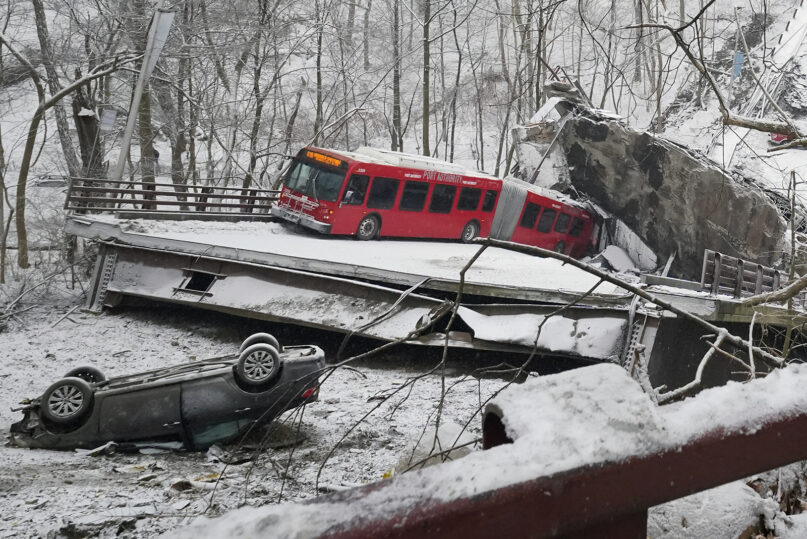(RNS) — Last month, a bridge in my Pittsburgh neighborhood collapsed into the ravine below it. The day before — on Jan. 27 — my daughter and I drove over the bridge separately so I could get my mandated inspection at my mechanic, directly across the bridge. And yet, the same authorities that compel all drivers to inspect their cars and have valid licenses and eye exams did not have the ability to ensure the stability of the bridge for the approximately 14,000 drivers who traverse it each day.
The collapse happened on the day President Biden was scheduled to give a speech at Carnegie Mellon University to discuss the country’s infrastructure needs. Pittsburgh is a city with almost 450 bridges. One source states that there are 176 bridges in poor condition in my county — more than anywhere else in the state. The fear of serious injury or death is real.
Biden promised to send federal funds to fix them all. But when I heard him speak that afternoon, I did not feel comforted. Maybe I was still in shock about how close I could have been to being the one plunged unwillingly into the ravine under the Fern Hollow Bridge.
I was missing a sense of justice. In the case of the bridge, it is a process that will take years and millions of dollars, and in the case of those people injured — only time will tell. When justice is done, a sense of restoration should be palpable, an understanding that the past can’t be undone but the trail into the future will include means to improve things.
I was on the elliptical machine at the Jewish Community Center gym last week when the verdict flashed on the television screen. The families of nine Sandy Hook school shooting victims would receive a $73 million settlement from Remington, the gun company that makes the rifle used to kill 26 children.
Attorney Josh Koskoff said at the press conference, “These families would give that (settlement) up to get their loved ones back. That would be true justice.” In fact, the victory in this case is not solely monetary. It holds the gun manufacturer accountable by requiring the release of its marketing records so that others who are suing gun makers will be able to use those records as well.
As President Biden said in a press release about the case, “while this settlement does not erase the pain of that tragic day, it does begin the necessary work of holding gun manufacturers accountable for manufacturing weapons of war and irresponsibly marketing these firearms.”
RELATED: God did not give Americans guns. To say otherwise is heresy.
A dismantling of the structure that makes the purchase and use of guns possible so that fewer are available for murderous ends is one way to begin a path to justice for the families affected and all who have been harmed by gun violence, including myself and my community.
The phrase “the bright day of justice” is one Martin Luther King Jr. used in his “I Have a Dream” speech of August 28, 1963. The phrase is based on a verse from the Prophet Isaiah. This section of Isaiah was chosen by the ancient rabbis as the prophetic portion to be read on the morning of the Day of Atonement, a time when worshippers reflect on the ways to change their behavior for the better in the coming year. It speaks of repairing ancient ruins and rebuilding foundations, freeing the oppressed and offering food for the hungry.
A bright day of justice means maintaining the structures of our society so that kids who are in school can grow up to become the people they have a right to become. When those harmed irreparably spend nine years fighting a system and still find the courage and willingness to hold those who harmed them to account, it gives me hope that this country will one day be one where “justice rolls down like waters, and righteousness like a mighty stream,” in the words of King and another prophet, Amos.
Until then, I hope all of our structures can be repaired.
READ: Dilemma for houses of worship: Openness or safety?
(Beth Kissileff is the co-editor of “Bound in the Bond of Life: Pittsburgh Writers Reflect on the Tree of Life Tragedy” and author of the novel “Questioning Return.” The views expressed in this commentary do not necessarily reflect those of Religion News Service.)





